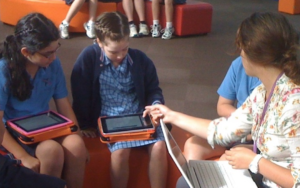ABOUT
 Challenge Based Learning provides an efficient and effective framework for learning while solving real-world Challenges.
Challenge Based Learning provides an efficient and effective framework for learning while solving real-world Challenges.
The Challenge Based Learning (CBL) framework is collaborative and hands-on, asking all participants (students, teachers, families, and community members) to identify Big Ideas, ask good questions, identify and solve Challenges, gain in-depth subject area knowledge, develop life skills, and learn how to learn.
The CBL framework emerged from the “Apple Classrooms of Tomorrow—Today” (ACOT2) project initiated to identify the essential design principles of the 21st-century learning environment. Starting with the ACOT2 design principles, Apple, Inc. worked with exemplary educators to develop and test CBL.
CBL builds on the foundation of experiential learning and leans heavily on the wisdom of a long history of progressive ideas. Innovative ideas from education, media, technology, entertainment, recreation, the workplace, and society inform the framework.
CBL is flexible and customizable and allows for multiple points of entry. The approach can connect and extend current practice, serve as the framework for specific capstone events during the school year, and act as an overarching institutional-wide framework for decision-making and learning.
Key Ideas
Threaded through the Challenge Based Learning framework is a series of foundational ideas. Familiarity with these concepts provides deeper insight into the process, opportunities for discussion, and implementation support.
- Teacher/Learner and Learner/Teacher. Ubiquitous access to information and technology allows the opportunity to break down the traditional hierarchical structure of schools and allows all participants to become teachers and learners.
- Moving beyond the four walls of the classroom. Involving all of the community members in the process expands resources, creates opportunities for authentic learning and moves the responsibility of education to the larger community.
- Learner Inspired, Directed, and Owned. CBL develops meaningful connections between content and the lives of Learners.
- Challenges Provoke Action. Situations or activities that create a sense of urgency and spur action.
- Content and Durable skills. Authentic learning experiences foster deep content knowledge and help Learners develop a wide range of durable skills organically.
- Boundaries of Adventure. Boundaries guide the way and provide freedom for Learners to take ownership of the process in a safe environment.
- Space and Freedom to Fail. CBL is a safe space for all learners to think creatively, try new ideas, experiment, fail, receive feedback and try again.
- Slowing for Critical and Creative Thinking. The learning process intentionally slows down to ensure full participation and provide opportunities for deep thinking.
- Authentic Use of Technology. Technology supports the process authentically, including research, communication, organization, creation, evaluation, documentation and persuasion.
- Focus on Process and Product. Getting to the solution is valued as much as the solution.
- Documentation and Storytelling. During each step of the challenge process, the learners document and publish using text, video, audio and pictures.
- Reflection. Throughout the process, learners continuously reflect on the content and the process.
CBL as . . .
Challenge Based Learning is flexible and works well with other pedagogical and professional frameworks. As a verb, it presents a philosophical approach to planning, problem-solving and learning. For example: Let’s CBL it!
As a noun, CBL can be an event embedded in a learning experience or serve as a capstone experience for a course. For example, The students will participate in a challenge at the end of the semester.
a verb:
- A way of thinking.
- Becomes central to the philosophy of the institution.
- Organizes other educational approaches
- Organizes the curriculum
- Used at all levels: planning, organizing, teaching.
- Language permeates the institution
a noun:
- Is a challenge event (or series of events)
- Includes a finite time span
- Is another tool in the toolkit
- Is used during specified point of the program
- Is used for a specific purpose.
